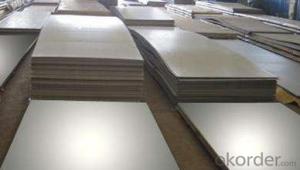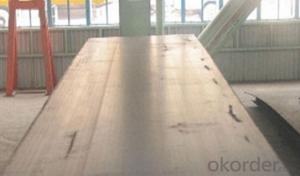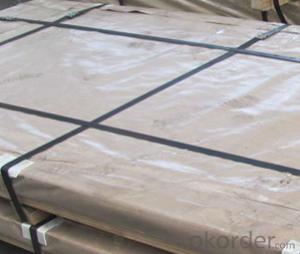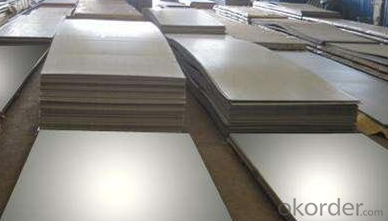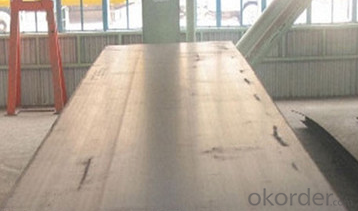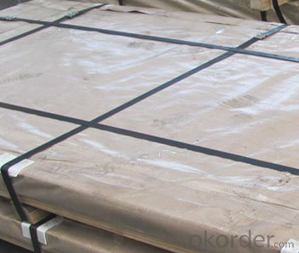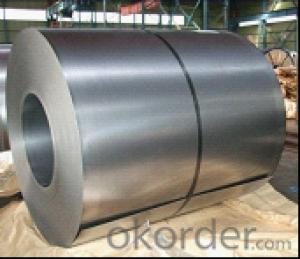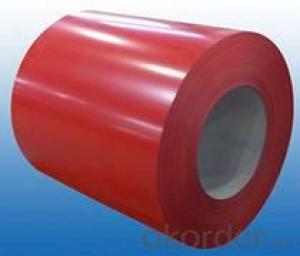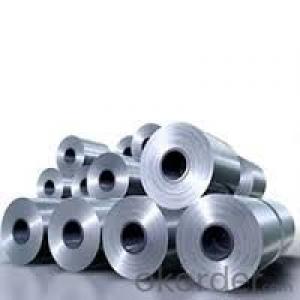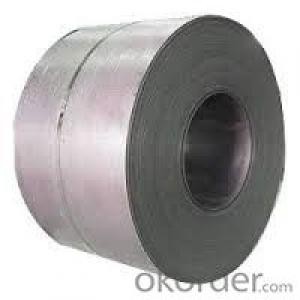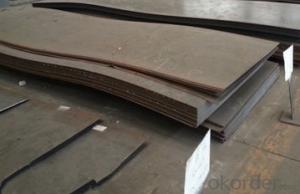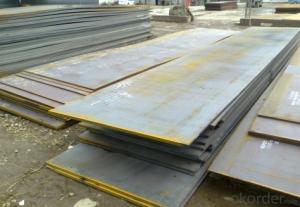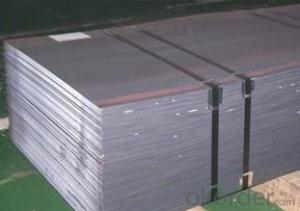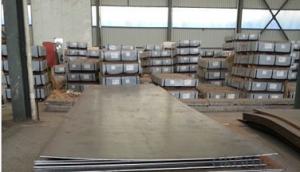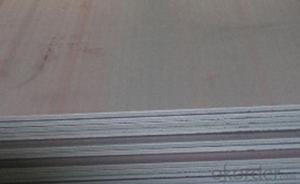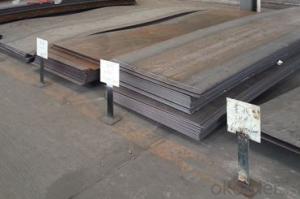Hot Rolled Carbon Steel Sheet Plate, A63 CNBM
- Loading Port:
- Qingdao
- Payment Terms:
- TT OR LC
- Min Order Qty:
- 10 pc
- Supply Capability:
- 30 pc/month
OKorder Service Pledge
Quality Product, Order Online Tracking, Timely Delivery
OKorder Financial Service
Credit Rating, Credit Services, Credit Purchasing
You Might Also Like
Quick Details
| Standard: | AISI, ASTM, DIN, GB, JIS | Grade: | A572,A573,A633,A678,A709,A710,G3101,G3136,etc | Thickness: | 1mm-200mm |
| Brand Name: | SHOU GANG GROUP, AN STEEL | Model Number: | Q235 | ||
| Type: | Steel Plate | Technique: | Hot Rolled | Surface Treatment: | Coated |
| Application: | widely | Special Use: | High-strength Steel Plate | Width: | 1000mm-3000mm |
| Length: | 1000mm-12000mm | Price Term: | FOB CIF CFR |
Packaging & Delivery
| Packaging Details: | standard seaworthy export packing or as the request of customers |
| Delivery Detail: | 10 days after deposit or according to customers' quantity |
Specifications
hot rolled carbon steel sheet
1.Thickness:1mm-200mm
2.Length:1000mm-12000mm
3.Width:1000mm-2000mm
hot rolled carbon steel sheet
| Product | HR steel plate prices carbon steel plate prices per kg |
| MOQ | 25 ton |
| Thickness | 1mm-200mm |
| Width | 1000mm-3000mm |
| Length | 1000mm-12000mm |
| Application | widely |
| Standard | AISI,ASTM,BS,DIN,JIS,GB,etc |
| Grade | A572,A573,A633,A678,A709,A710,G3101,G3136,etc |
| Tpye | Steel plate |
| Surfacing | Coated |
| Productive Technology | Hot Rolled & Cold Rolled |
| Port | |
| Payment Terms | L/C,T/T,Western Union,MoneyGram |
| Product Ability | 5000 tons per month |
| Delivery | 10 days after deposit or according to customers' quantity |
| Packing | standard seaworthy export packing or as the request of customers |
- Q: Can steel sheets be used for staircase railings?
- Yes, steel sheets can be used for staircase railings. Steel is a strong and durable material that can provide stability and safety to staircase railings. It can be shaped and designed to create various styles and patterns, making it a versatile choice for railings.
- Q: What are the insulation properties of steel sheets?
- Compared to other commonly used insulation materials like fiberglass or foam, steel sheets have relatively poor insulation properties. This is because steel is an excellent conductor of heat and electricity, possessing high thermal conductivity. Consequently, steel sheets are ineffective in preventing heat transfer and are not typically used as standalone insulation materials. Nonetheless, steel sheets can still offer some insulation benefits when utilized alongside other insulating materials. For example, they can serve as a protective layer or cladding, enhancing the durability and fire resistance of insulation systems. Additionally, they can function as a radiant barrier, redirecting heat away from buildings and reducing heat gain in warm climates. To summarize, although steel sheets themselves do not possess exceptional insulation properties, they can contribute to improving overall insulation performance when combined with other insulating materials or applied in specific scenarios such as radiant barriers.
- Q: What are the common thicknesses available for steel sheets?
- The common thicknesses available for steel sheets vary depending on the specific application and industry. However, some of the typical thicknesses for steel sheets range from 0.5mm to 25mm, with increments of 0.5mm or 1mm.
- Q: Are steel sheets vulnerable to UV radiation?
- Steel sheets are generally not vulnerable to UV radiation. This is because steel is a highly durable and resilient material that is resistant to many environmental factors, including UV radiation. Unlike some other materials, steel does not become weakened or degraded when exposed to prolonged sunlight or UV rays. In fact, many steel structures, such as buildings, bridges, and outdoor equipment, are designed to withstand outdoor conditions and can last for several decades without significant damage from UV radiation. However, it is important to note that certain types of steel, such as galvanized steel, may be more resistant to UV radiation due to additional protective coatings applied during the manufacturing process. Overall, steel sheets are a reliable choice for applications that require resistance to UV radiation.
- Q: What are the common thicknesses for corten steel sheets?
- The common thicknesses for corten steel sheets range from 1.5mm to 16mm.
- Q: Can steel sheets be used for automotive wheels?
- No, steel sheets are not typically used for automotive wheels. Instead, wheels are commonly made from aluminum alloy due to its lighter weight and better performance.
- Q: Can steel sheets be used for electrical switchgear?
- Yes, steel sheets can be used for electrical switchgear. Steel is a common material choice for switchgear enclosures due to its durability, strength, and ability to provide protection from environmental factors such as moisture, dust, and temperature fluctuations. Steel sheets are commonly used in the construction of switchgear cabinets and enclosures to provide a robust and secure housing for electrical components. The steel sheets used for switchgear are typically coated or painted to provide additional protection against corrosion. Additionally, steel is a good conductor of heat, which helps dissipate any heat generated by the electrical components within the switchgear. Overall, steel sheets are a suitable material for electrical switchgear enclosures due to their mechanical properties, protective capabilities, and thermal conductivity.
- Q: Can steel sheets be rolled into cylinders or tubes?
- Yes, steel sheets can be rolled into cylinders or tubes through a process called roll forming.
- Q: How do steel sheets perform in terms of noise reduction?
- Steel sheets have excellent noise reduction properties due to their high density and stiffness. They effectively absorb and dampen sound waves, resulting in reduced noise transmission and improved acoustic insulation.
- Q: What are the applications of steel sheets in construction?
- Due to their exceptional strength, durability, and versatility, steel sheets find a wide range of applications in the construction industry. Some of the key uses of steel sheets in construction are: 1. Roofing and cladding: Steel sheets are commonly employed in both residential and commercial buildings for roofing and cladding purposes. They offer a long-lasting and weather-resistant solution, safeguarding the structure against the elements. 2. Structural components: Steel sheets are utilized to construct beams, columns, and trusses, which are essential structural components. The high strength-to-weight ratio of steel enables the creation of lightweight yet robust structures capable of withstanding heavy loads and seismic forces. 3. Flooring: In industrial buildings, warehouses, and factories, steel sheets are often used as flooring material. Their smooth surface facilitates easy cleaning and maintenance, and their strength and fire-resistant properties ensure a safe working environment. 4. Wall partitions: Steel sheets are commonly used in the construction of wall partitions due to their stability and sound insulation properties. They can be easily cut and shaped to fit any design, allowing for flexible and customizable partition layouts. 5. Ductwork and HVAC systems: Steel sheets find extensive use in the fabrication of ductwork and HVAC systems. Their smooth and airtight surfaces enable efficient air movement and regulation, ensuring proper ventilation and temperature control in buildings. 6. Reinforcement: Steel sheets are frequently integrated into concrete structures as reinforcement. This enhances the strength and load-bearing capacity of the building, making it more resistant to bending, tension, and compression forces. 7. Safety and security: Steel sheets are utilized in the construction of safety and security features such as doors, gates, and window frames. Their high strength and resistance to impact and vandalism make them an ideal choice for ensuring the safety and protection of a building. In conclusion, steel sheets play a crucial role in construction for various applications, including roofing, cladding, structural components, flooring, wall partitions, ductwork, reinforcement, and safety features. Their superior strength, durability, and versatility make them an indispensable component in different construction projects, contributing to the overall safety, longevity, and functionality of buildings.
Send your message to us
Hot Rolled Carbon Steel Sheet Plate, A63 CNBM
- Loading Port:
- Qingdao
- Payment Terms:
- TT OR LC
- Min Order Qty:
- 10 pc
- Supply Capability:
- 30 pc/month
OKorder Service Pledge
Quality Product, Order Online Tracking, Timely Delivery
OKorder Financial Service
Credit Rating, Credit Services, Credit Purchasing
Similar products
Hot products
Hot Searches
Related keywords
